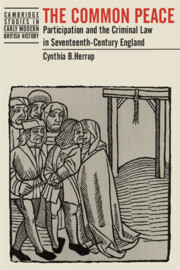Book contents
- Frontmatter
- Contents
- List of figures and tables
- Acknowledgments
- Glossary
- Abbreviations and conventions
- 1 The criminal law in early modern England
- 2 The setting
- 3 Judicial power and cooperation in eastern Sussex
- 4 From crime to criminal accusation
- 5 From accusation to indictment
- 6 From indictment to conviction
- 7 Becoming a criminal
- 8 The common peace
- Appendix 1 Summary of sampled courts
- Appendix 2 Status categories
- Bibliography
- Index
- Cambridge Studies in Early Modern British History
7 - Becoming a criminal
Published online by Cambridge University Press: 10 January 2011
- Frontmatter
- Contents
- List of figures and tables
- Acknowledgments
- Glossary
- Abbreviations and conventions
- 1 The criminal law in early modern England
- 2 The setting
- 3 Judicial power and cooperation in eastern Sussex
- 4 From crime to criminal accusation
- 5 From accusation to indictment
- 6 From indictment to conviction
- 7 Becoming a criminal
- 8 The common peace
- Appendix 1 Summary of sampled courts
- Appendix 2 Status categories
- Bibliography
- Index
- Cambridge Studies in Early Modern British History
Summary
Most convictions in eastern Sussex were for felonies and all common law felonies shared the single punishment of execution. The central paradox of the early modern English penal system was that, while allegedly only hanging avenged crime and instructed people about the dangers in a sinful life, routine recourse to executions seemed to do little to educate anyone about either royal justice or royal mercy. Life was too complex and humanity too imperfect to conform easily to a legal structure that defined almost every crime as a felony and penalized all felonies with death. The law relied too heavily upon communal participation to function except where the penal structure could express both modulated degrees of popular outrage and the finality of official power. The administrators of the criminal law in early modern England maintained their legitimacy by enforcing the law as a blend of technical rigidity and practical flexibility. Eighty percent of the persons found guilty in eastern Sussex could have been hanged for their crimes, but at least two-thirds were saved from the gallows through grants of benefit of clergy, remands, pardons, or more exotic disciplinary alternatives such as impressment into military service or transportation overseas. Most convicted or confessed felons proceeded with their lives and never reappear in the surviving records.
- Type
- Chapter
- Information
- The Common PeaceParticipation and the Criminal Law in Seventeenth-Century England, pp. 165 - 192Publisher: Cambridge University PressPrint publication year: 1987



